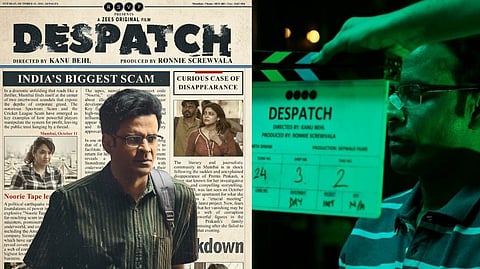

With his new film Despatch, which had its India premiere at MAMI Mumbai Film Festival this year and is streaming soon on ZEE5, Kanu Behl decides to steer clear of genre tropes. His crime journalist Joy (Manoj Bajpayee) is not someone who has the sole goal of uncovering the truth or ensuring justice. Joy doesn’t flaunt a badge of idealism. Rather, he is incessantly human, with his own desires and shortcomings.
It wasn’t smooth for Kanu to arrive at this insight. In 2016, Kanu and his co-writer Ishani Banerjee were immersed in extensive research. This involved reading reports of journalists’ deaths, observing the changing nature of media, and speaking to lawyers, scribes, cops and gangsters. That’s when they hit a roadblock.
“We realised that you will never really know who did what and why,” says Kanu, adding that they were unable to ‘uncover’ the truth. What they were left with were some questions: “What if you never find out what this journalist was trying to expose?” “Why are journalists in films reduced to being a ‘hero’ saving the day?” “Why don’t we see their human side?” Kanu and Ishani then decided to subvert the idea of a journalist and that of an investigative thriller. The director calls Despatch a procedural. “We were going more for a character piece,” says Kanu. “We wanted to take viewers inside his life and get a sense of the time and space he is living in.”
A larger world
The character of Joy seems similar to real-life crime journalist Jyotiromoy Dey, who was murdered by the underworld in 2011. Jyotiromoy’s story formed the context of Hansal Mehta’s 2022 series Scoop. Kanu, however, says that Despatch is not based on any person. “Joy is just an amalgamation of all the journalists we met,” he says. “The goal was to paint a picture of a much larger world.”
Kanu’s earlier films have also provided different perspectives of looking at the world, be it the nuanced portrayal of a dysfunctional, criminal family in the unapologetically violent Titli (2015) or the exploration of sexual frustration in a young man from a small town in the audacious Agra (2023).
He has worked mostly with fresh faces in the past, and with a seasoned actor like Manoj in the lead, Despatch comes as an exception. “He, however, came in every morning as if it were his first day on set,” says Kanu. The filmmaker says it was Manoj’s urge to find the ‘moment’ every day that actually surprised him. “I have not seen that hunger even in beginners,” he says.
Kanu was initially concerned, owing to his unconventional approach of working with actors. His rehearsals include a lot of ‘random’ rhythm exercises, which have little to do with the scenes in the script. “One day we will just be walking together. Sometimes you’re doing body language, trying to find how this character talks, or you are just meditating for half a day trying to find your centre as an actor,” he says. On such days, Kanu reveals that even Manoj was a bit “thrown off”. “‘What do you want?’ he would ask,” says Kanu. “But I had his trust, enough to turn around and say ‘I don’t know, let’s find out.”
Approach to intimacy
What stands out in Kanu’s filmography is his peculiar approach to intimate scenes (In Agra, the protagonist goes at it with his partner on a dinner table, only to be horrified when she turns into a rat!). In Despatch, Joy is a philanderer involved with multiple women, played by Shahana Goswami, Rituparna Sen and Parvati Sehgal. “I don’t shoot sex scenes to titillate. They are a transaction of emotions,” he says.
Watching Kanu’s films is like battling our own expectations. The unpredictability lies in how he chooses to tell the story. Does he think of the audience while making his films? “I do have an audience in mind, but that audience is me,” he says with a smile. He explains that it is important for a director to not have an ego.
“If you have yourself interfering with the film, then it will never see the light of day.” He says he likes to maintain a distance from his films in order to let them become what they want to. “So, if I am not there as a filmmaker, what am I there for? Then I am there as an audience. I have this deep faith that if I, as an audience, want to see this film, then there are others out there who want to see it too,” he concludes.